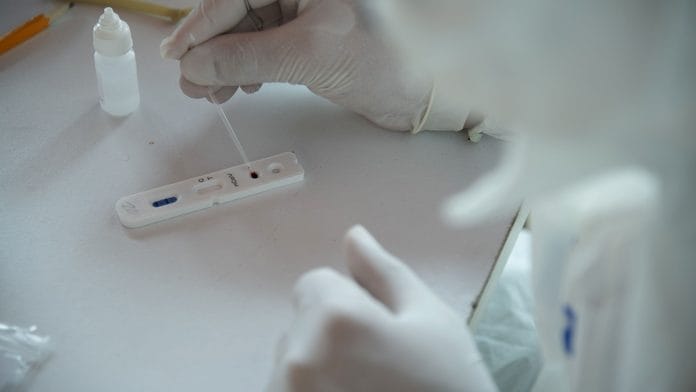New Delhi: In view of its high specificity but relatively low sensitivity, the ICMR has recommended the use of rapid antigen test kits for diagnosis of COVID-19 in containment zones and healthcare settings in combination with the RT-PCR test.
The kits will allow faster diagnosis without laboratory examination.
Standard Q COVID-19 Ag detection kit (rapid antigen test kits) is a rapid chromatographic immunoassay for qualitative detection of specific antigens to SARS-CoV-2. It has been developed by SD Biosensor, a South Korea based company, the ICMR said in an advisory.
Suspected individuals who test negative for COVID-19 by rapid antigen test should be tested sequentially by RT-PCR to rule out infection, whereas a positive test should be considered as a true positive and does not need reconfirmation by RT-PCR test, said ICMR said.
The Standard Q COVID-19 Ag detection can be interpreted as positive or negative after 15 minutes of putting the sample into the well by appearance of test and control lines, which can be read with a naked eye, requiring no specialized equipment, it said.
The maximum duration for interpreting a positive or negative test is 30 minutes. After that the test strip should be discarded, it said.
In view of its high specificity while relatively low sensitivity, ICMR recommends the use of Standard Q COVID-19 Ag detection assay as a point of care diagnostic assay for testing under (containment zones and healthcare settings) settings in combination with the gold standard RT-PCR test, the advisory said.
The ICMR further said that the Standard Q COVID-19 Ag rapid antigen detection test has a very high specificity (i.e. ability to detect true negatives).
“Specificity ranged from 99.3 per cent to 100 per cent at the two sites. Sensitivity of the test (i.e. ability to detect true positives) ranged from 50.6 per cent to 84 per cent in two independent evaluations, depending upon the viral load of the patient. Higher viral load correlated with higher sensitivity,” it said.
Also read:World’s most accurate antibody test has arrived. Or has it?






